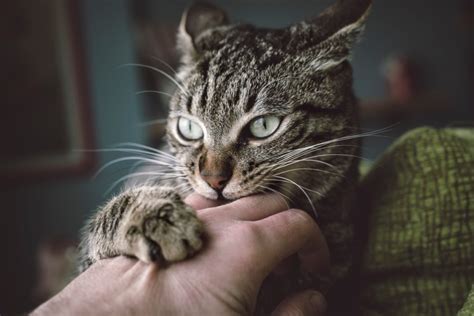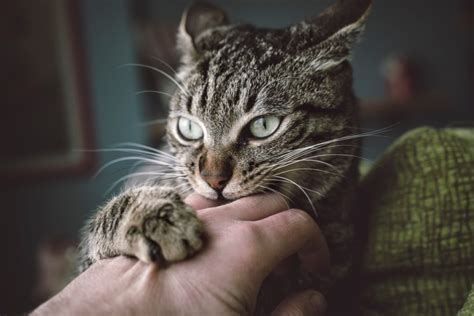When we welcome these enigmatic creatures into our lives, it becomes apparent that they possess a fascinating array of behaviors that often leave us spellbound. However, one behavior that can cause both puzzlement and discomfort is their tendency to engage in gentle nibbling or fierce biting. While this behavior is a natural instinct for our feline companions, it can sometimes escalate into a worrisome habit.
A keen insight into the factors triggering this peculiar conduct is imperative for feline enthusiasts and owners alike, as it allows for the implementation of effective preventive measures and timely intervention.
It is crucial to comprehend that there is a multitude of reasons behind these intriguing actions by our feline friends. Experts in animal behavior have identified numerous factors that can contribute to the manifestation of this particular trait. Furthermore, it is essential to recognize that these triggers can vary from one cat to another, making each case unique and requiring tailored approaches.
Exploring the underlying causes and potential behavioral patterns will enable pet owners to better understand their furry companions, establish a stronger bond, and develop informed strategies to address this intriguing yet challenging aspect of cat behavior.
Understanding the Reasons Behind Feline Nipping Behavior and Effective Methods to Deter It

Exploring the motives behind a cat's inclination to bite is essential for any feline owner. By gaining a deeper understanding of the underlying causes, one can take proactive measures to prevent this behavior from occurring. It is important to recognize that cats have their unique ways of communicating, and biting is one such form of expression; however, it is crucial to discourage this behavior to maintain a harmonious relationship with our feline companions.
- Territorial Instincts: Felines naturally have a strong instinct to defend their personal space and mark their territory. This territorial nature may lead to biting, particularly when their boundaries feel threatened. Recognizing and respecting their need for personal space can help prevent biting incidents.
- Fear or Anxiety: Cats may resort to biting when they feel afraid or anxious. Identifying triggers that evoke fear or anxiety in our feline friends, and providing them with a safe and secure environment, can minimize these episodes of biting.
- Play Aggression: Playful nipping is a common behavior in cats, especially in kittens. While it may be an innocent form of interaction, it is important to redirect this behavior appropriately to prevent it from becoming an issue in the future.
- Pain or Discomfort: Cats may resort to biting as a means of signaling pain or discomfort. It is crucial to monitor their health and promptly address any underlying medical conditions that may be contributing to their biting behavior.
- Lack of Socialization: Cats that are not properly socialized may exhibit defensive biting behavior when faced with unfamiliar situations or individuals. Gradual exposure and positive reinforcement techniques can assist in overcoming this issue.
Preventing cat biting requires a comprehensive approach that involves understanding the specific triggers for our feline companions and implementing effective preventive measures. By addressing these causes and taking appropriate actions, we can foster a safe and nurturing environment that promotes positive cat-human interactions, minimizing or eliminating biting behavior altogether.
Understanding the Root Causes of Feline Biting Behavior and Implementing Effective Precautionary Measures
Exploring the underlying reasons behind a cat's tendency to bite and discovering effective strategies to prevent such behavior is vital for ensuring a harmonious coexistence with our feline companions. By delving into the motivations and triggers behind their biting tendencies, we can implement the necessary precautionary measures to create a safe and calm environment for both cats and humans.
Unraveling the core reasons behind feline biting behavior
It is essential to comprehend that a cat's instinctual nature and unique personality traits significantly contribute to their propensity to bite. Factors such as fear, anxiety, stress, frustration, pain, territorial aggression, and learned behavior can drive cats towards biting. Expanding our knowledge about these inner motivations allows us to better identify the root causes and address them effectively.
Implementing proactive measures for bite prevention
Preventing cat biting involves a combination of education, responsiveness, and environmental enrichment. By creating a secure and stimulating environment for our feline companions, we can minimize potential stressors and provide alternative outlets for their natural instincts. Employing positive reinforcement techniques, such as reward-based training and redirecting their focus onto appropriate toys, can also contribute to reducing biting incidents.
Importance of socializing and human-feline interaction
Encouraging healthy socialization and positive human-feline interaction is paramount in deterring biting behavior in cats. Gradual exposure to various people, situations, and animals can enhance a cat's ability to cope with potential stress triggers, thus decreasing the likelihood of resorting to biting as a defensive mechanism. It is crucial to foster a bond built on mutual trust and respect through gentle handling techniques and consistent affection.
Seeking professional guidance and intervention
In severe cases where cat biting persists despite consistent preventive efforts, seeking professional assistance from veterinarians, animal behaviorists, or trainers is highly recommended. These experienced individuals can conduct comprehensive evaluations, provide personalized guidance, and prescribe appropriate treatment plans tailored to the specific needs of both the cat and its environment.
To coexist harmoniously with our feline friends, it is crucial to delve into the reasons behind their biting behavior, actively prevent such incidents, promote healthy socialization, and seek professional help when necessary. By prioritizing a safe and stimulating environment and nurturing a strong bond, we can reduce the occurrence of biting and ensure a peaceful and fulfilling relationship with our beloved feline companions.
Managing Feline Nipping: Effective Measures and Altering Behavioral Patterns

Exploring strategies to address and modify the rather natural instinct of feline nibbling and sharp tooth encounters.
Discovering successful approaches to tackle the issue of feline nipping, thereby curbing and transforming this instinctual behavior into a more suitable and controlled manner.
Exploring Effective Strategies to Address Feline Aggression and Modify their Aggressive Behavior
Understanding and addressing the issue of cat biting requires robust techniques that promote a safer and harmonious relationship between cats and their owners. This section aims to explore reliable methods that can be employed to treat cat biting problems and effectively modify their aggressive behavior.
1. Behavior Modification:
Implementing behavior modification techniques is crucial in addressing cat biting issues. By utilizing positive reinforcement, redirection, and intercat communication techniques, pet owners can encourage alternative behaviors and discourage aggressive tendencies. Consistency, patience, and a thorough understanding of feline behavior are key to effectively modifying aggressive behavior in cats.
2. Environmental Enrichment:
Creating an enriched environment for cats can help discourage biting behaviors. Providing ample opportunities for mental stimulation, play, and exercise can alleviate boredom and redirect their energy away from aggressive tendencies. Enrichment activities such as puzzle toys, scratching posts, and interactive playtime can help promote healthier interaction and reduce the occurrence of biting incidents.
3. Health Assessment:
Regular veterinary check-ups are essential to rule out any underlying medical conditions that may contribute to cat biting behavior. Pain, discomfort, or illness can often manifest as aggression in cats. Identifying and addressing these underlying issues through regular health assessments can significantly improve their behavior and reduce instances of biting.
4. Professional Training:
Seeking the assistance of a professional animal behaviorist or cat trainer can provide valuable insights and guidance in addressing cat biting issues. These experts can assess the specific needs and behavior of your feline companion and design a customized training plan to modify their aggressive behavior. Professional training can equip pet owners with the necessary skills and techniques to effectively manage and prevent biting incidents.
5. Consistency and Positive Reinforcement:
Consistency in training and interaction is crucial in addressing cat biting issues. Rewarding desired behaviors with treats, praise, and affection, while redirecting or ignoring unwanted behaviors, can help cats understand what is expected of them. Patience, persistence, and a positive approach are key to modifying aggressive behavior and fostering a stronger bond with your feline companion.
By implementing a combination of these reliable methods, pet owners can effectively treat cat biting problems, promote a safer environment, and foster a long-lasting positive relationship with their feline friends.
FAQ
Why does my cat bite me?
There are several reasons why your cat may be biting you. It could be due to aggression, fear, pain, or even playfulness. It's important to observe your cat's behavior and body language to determine the underlying cause.
How can I prevent my cat from biting?
Preventing your cat from biting involves understanding their behavior and addressing any underlying issues. You can provide them with plenty of toys and mental stimulation, socialize them properly, and establish clear boundaries. Additionally, always be gentle and avoid rough play that can encourage biting.
What should I do if my cat bites me?
If your cat bites you, it's important to remain calm. Immediately stop any interaction with the cat and avoid punishing them, as it may escalate the situation. Wash the wound with soap and water, apply an antiseptic, and seek medical attention if necessary. It's also crucial to assess why the biting occurred and address any underlying issues to prevent future incidents.
Is it normal for cats to bite during play?
Yes, it is normal for cats to bite during play. Biting is a natural behavior for them, similar to how they would bite their prey. However, it's essential to establish boundaries and train them to inhibit their bite. Encourage gentle play and redirect their attention to appropriate toys to prevent them from biting you.
Can biting be a sign of a health problem in cats?
Yes, biting can sometimes be a sign of an underlying health problem in cats. If your cat suddenly starts biting more frequently or aggressively, it's advisable to consult a veterinarian to rule out any medical conditions that may be causing pain or discomfort, leading to the biting behavior.
Why does my cat bite me?
There can be several reasons why a cat bites its owner. It could be due to fear, aggression, pain, frustration, or even playfulness. It's essential to identify the underlying cause to effectively address the issue.




